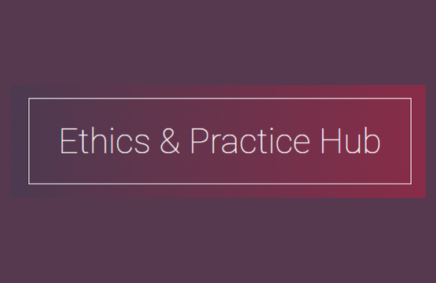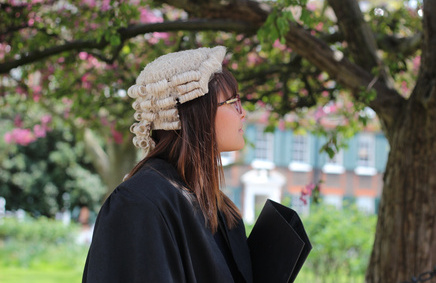About the seminar
Familiarise yourself with common ethical scenarios at the criminal and civil Bar, and learn more about how and when to use the Bar Council’s ethical enquiries service.
- Gain insight into common ethical scenarios that you may face as a barrister
- Know what to do if you are in court and an urgent ethical issue arises
- Learn more about the Bar Council’s free-to-use ethical enquiries service, and when to use it
- Get practical advice on how to adhere to your ethical duties and responsibilities as a barrister
- Hear from experts about real-world ethical challenges at the Bar
- Learn how to approach challenging ethical issues relating to your clients, opponents, and judges
Resources
Our ethical enquiries service - we run the confidential Ethical Enquiries Service for barristers and their support staff, to assist them to identify, interpret and comply with their ethical obligations under the BSB Handbook. We also maintain many ethics and practice guidance documents the Ethics & Practice Hub.
Bar Standards Board:
Presentation
Scenarios
Relevant guidance: Client incapacity
- You arrive at court and meet your client, Ms Smith, for the first time
- You smell alcohol on her breath and consider that she has been drinking
- It is 10am and she is due to be giving evidence
- You speak to her and advise that it is your opinion that you seek an adjournment on her behalf in order that she can sober up
- She denies being drunk and instructs you to proceed with her case
- Although she seems to understand what you are telling her, you do not consider it is in her best interests to proceed with the case
- What can you tell the court?
- You arrive at court and meet your client, Mr Jones, for the first time
- Your papers mention that he has a history of mental health issues but no concerns as to capacity had previously been raised
- After speaking to him for a few minutes you are concerned that he might not be able to give proper instructions by reason of lack of mental capacity
- You discuss your concerns with your instructing solicitor who agrees with you that Mr Jones’ mental health appears to have deteriorated
- You tell Mr Jones that your advice is to make an application to the court for expert evidence to consider his litigation capacity
- He forbids you to do so
Relevant guidance:
- Absconding clients: what to do if your client has absconded
- Returning Instructions in Criminal Cases: R v Daniels [2021] EWCA Crim 44
You are instructed to defend a financial controller for a local council (“D1”) charged with fraud by false representation. The false representations are said to be a number of invoices which, the prosecution allege, your client created using a fictitious company’s name. Your client then authorised payment of the invoices, and the money was sent to the company’s bank account, to which his deputy at the council was the sole named signatory. The deputy (“D2”) has also been charged.
Your client gave a no comment interview, but he provided a signed defence statement in which he asserted that D2 is solely responsible for the fraud. He also provided your solicitor with the password to his personal email account, from which he sent a number of emails to the OIC and D2 as the case was being investigated. He is on bail.
During the trial the prosecution serves further documents which prove that your client created the fictitious company. Your client alleges that the new documents are forgeries, created either by the OIC or D2.
The next morning he produces copies of emails from the OIC to his email account which appear to show that the OIC has known about the “new” evidence for some time, and that he has real doubts about their authenticity. He instructs you to cross-examine the OIC using the emails. You cross-examine the officer, producing the emails. He says he has never seen them before.
The trial is adjourned overnight. The next morning your client fails to attend court, and later that day it transpires that he has left the jurisdiction. He does not respond to your solicitor’s emails and phone calls.
While all this has been going on, your solicitor has checked your client’s email account, using the password provided. It transpires that the emails from the OIC that you deployed in cross-examination were not sent to your client’s email account after all, and after looking at the email account yourself you conclude that they are forgeries.
Relevant guidance:
- BSB Guidance for barristers using social media
- BSB Guidance on the regulation of non-professional conduct
- Bar Council- Media Comment: Expressing personal opinions about your cases to or in the media
You are instructed to defend a man charged with rape. He has a large online presence, with hundreds of thousands of followers on YouTube and X. As the trial approaches he releases a video in which he reveals that he has instructed you to defend him, and that your success rate defending serious sexual offences is “second to none” (he may have got that quote from your clerk), and he has no doubt he will be found not guilty. The issue is consent.
At the trial, the jury convict your client, and the judge remands him in custody pending sentence. Your client is very unhappy, and before he is taken away he indicates to you that he would like to appeal his conviction. During the trial you had a paralegal from your solicitors with you, and after you leave the cells she posts on X and LinkedIn that she is amazed by the jury’s verdict, which doesn’t reflect the evidence, and that the conviction will definitely be appealed. She adds that the judge was so old that he hadn’t heard of the defendant, and that anyone who had seen his videos on YouTube would know that he couldn’t possibly be guilty. The paralegal, a barrister who has applied for a pupillage in Chambers, only has a few hundred followers, but the next day her posts are reposted by the defendant’s accounts, reaching an audience of almost a million people. Your clerks are inundated with calls from media outlets asking you to comment.
You have been instructed for the defence in a very serious case, which would carry a long term imprisonment if your client is convicted. You have come into the trial after it started due to previous counsel withdrawing for professional reasons.
Your client instructs you to make serious allegations of dishonesty against a number of prosecution witnesses. The allegations appear gratuitous and unnecessary for the defence case. You advise that it would be against your client's interests to put them because they would trigger a probably successful application to introduce evidence of bad character. The defence case can properly be run without attacking the character of prosecution witnesses.
Your client accepts the advice, reluctantly but nonetheless. You cross-examine the first witness without making the allegations. Your client, however, becomes extremely angry and complaints that you have not followed their instructions and says you are actively working against them and dismisses you from the case. You have already come to suspect that the client may be suffering from a mental illness or disorder but they have refused to see a psychiatrist. You tell the client there will be a cooling-off period. The following day the client apologizes and says they wish to retain you. However following similar cross-examination of another witness the complaint is renewed and you are again told that you have been dismissed from the case. You offer a cooling off period but it is rejected.
Speakers

Francis FitzGibbon KC, 23ES
Francis FitzGibbon KC has a wide-ranging and diverse trial practice in serious crime (prosecuting and defending). High profile cases include R. v Marten (manslaughter of a baby), R. Mohammadi (the Colindale allotment murder) and R v Alemi (fraud by working as a psychiatrist with forged educational certificates). He undertakes high-profile appellate work (including the Supreme Court case of Jogee [2016] UKSC 8, which changed the law of joint enterprise). He has a special interest cases of human trafficking (including the leading case AAD [2022] 1 Cr App R 19), and miscarriage of justice cases before the Criminal Cases Review Commission.

James Hines KC, Three Raymond Buildings
James Hines KC acts in major international fraud, crime and extradition cases, both prosecuting and defending. James has acted in numerous SFO, FCA, and CMA cases. He is Chair of the Fraud Lawyers’ Association. He is currently defending in SFO v London Mining Plc (bribery of government officials in Sierra Leone) due to be heard in spring 2026, and, on the prosecution side, he is instructed by the SFO in the Axiom Ince trial, he is also instructed in the Libor appeal in the Supreme Court.
In crime he has acted in all areas. Recent cases include a number of murder cases including Operation Rockrose, a contract killing, an EncroChat case.
Notable clients include Silvio Berlusconi, a suspect in the 1MDB trial in Malaysia, Glenn Mulcaire (News of the World phone hacking) and ‘the Nat West Three’.
Called 1982, Silk 2015. James is Co-Chair of the Ethics Committee and is a visiting professor at BPP University Law School.

Charlotte Reynolds, 12 King's Bench Walk
Charlotte represents both claimants and defendants in a broad range of catastrophic personal injury and clinical negligence claims including those involving brain injury, spinal injury, and amputation claims.
Charlotte has a particular interest in claims involving dishonesty ranging from high value claims involving exaggerated injury and loss to staged accidents, and regularly lectures on the topic. She is often involved at an early stage to review the evidence and advise on the best tactical approach to lead the case to a successful resolution be that a finding of fundamental dishonesty, discontinuance, or settlement well below the pleaded value.
Charlotte also advises insurers and policyholders on policy disputes concerning policy wording and coverage and indemnity issues.
Charlotte is also a member of the Bar Council Ethics Committee.

Danny Robinson KC, 5KBW
Danny Robinson KC is renowned for his expertise in cases of serious fraud, homicide, sexual offending and all forms of organised crime. He is listed by both Chambers UK and the Legal 500 as a leading silk. He has particular expertise in cases involving RIPA, PII and disclosure issues.
Useful resources
Ethics guidance
Contact the Ethical Enquiries Helpline, or visit the Bar Council's Ethics & Practice Hub to view ethics and practice documentation and guidance
Young Bar
Guidance for newly qualified barristers on how to build their practice and develop their skills




